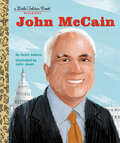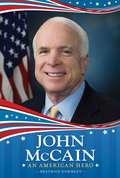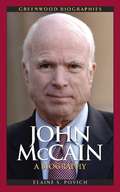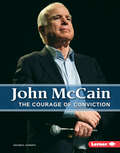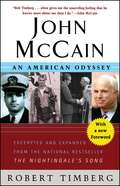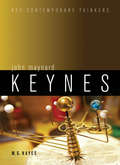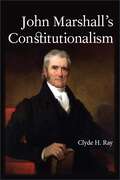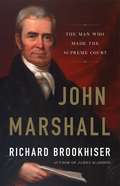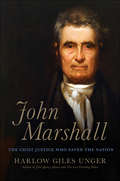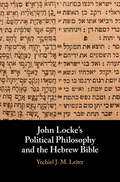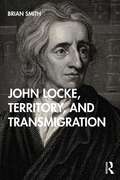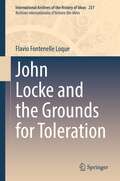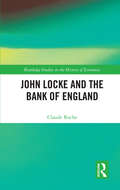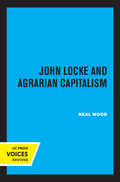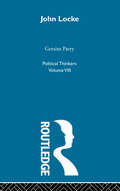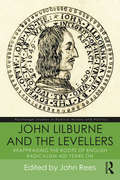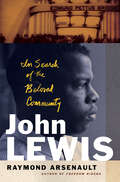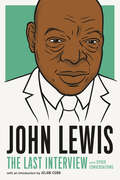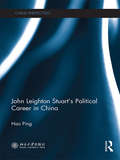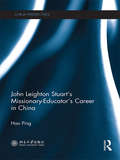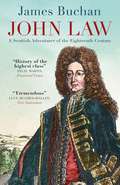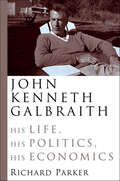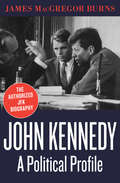- Table View
- List View
John McCain: A Little Golden Book Biography (Little Golden Book)
by Gram AdamsHelp your little one dream big with a Little Golden Book biography that's all about Senator John McCain! It's the perfect introduction to nonfiction for preschoolers.This Little Golden Book about John McCain--the Vietnam war veteran, six-term U.S. senator from the state of Arizona, and Republican presidential nominee—is an inspiring read-aloud for young girls and boys.Look for more Little Golden Book biographies: • Misty Copeland • Frida Kahlo • Iris Apfel • Bob Ross • Queen Elizabeth II • Harriet Tubman
John McCain: An American Hero
by Beatrice GormleyLearn all about the life of Senator John McCain in this enlightening biography specially written for a younger audience. Five-term Arizona senator John S. McCain’s indelible mark on America was perhaps his destiny, as his grandfather proclaimed when he was just an infant, “This boy has the stamp of nobility on his brow.” <P><P> Following both his four-star US Navy father and grandfather into military service, McCain’s naval career imprinted the code of honor he has maintained to this day. Throughout the myriad life and death perils he faced—most notably being held captive as a Vietnam War prisoner of war for five and one half years in the Hoa Lo Prison or ‘Hanoi Hilton’—his courage, bravery, and tenacity has served him time and time again: as Navy liaison to the US Senate, as a member (and then chairman) on the Armed Services Committee, Commerce Committee, and Indian Affairs Committee, playing a key role in restoring diplomatic relations with Vietnam, championing finance reform by sponsoring the McCain-Feingold Act, and as the Republican nominee for president in 2008. <P><P> Beatrice Gormley’s enriching biography tells the riveting story of one of America’s last, great, enduring heroes.
John Mccain: A Biography
by Elaine S. PovichJohn McCain's "maverick" streak and military-forged code of honor have coexisted uneasily at times with the demands of his political career and his determined pursuit of the presidency.
John McCain: The Courage of Conviction (Gateway Biographies Ser.)
by Heather E SchwartzThis timely title examines the remarkable life and death of John McCain, from his time as a decorated war veteran to elder statesman. Accessible text and plentiful photos cover McCain's early life, his military career, his political legacy, and his 2017 diagnosis of brain cancer. Up-to-the-minute details round out this latest look at a uniquely American figure.
John McCain: An American Odyssey
by Robert TimbergRobert Timberg, an award-winning Washington journalist, is a 1964 U. S. Naval Academy graduate and a Marine veteran of the Vietnam war. He was The Baltimore Sun's White House correspondent during the Reagan presidency.
John Maynard Keynes (Key Contemporary Thinkers)
by M. G. HayesJohn Maynard Keynes is the 20th century’s greatest economist. He sparked an intellectual revolution that transformed economic theory and policymaking. This book, written in plain English with minimal mathematics, is a concise and probing account of his major ideas. Keynes, argues Mark Hayes, showed that economics is a science of thinking in terms of models, in which progress depends on recognising when established models have become obsolete and new ones are required. Hayes outlines how Keynes did this, tracing his progression from the ‘Classical’ model that he inherited through to his masterpiece, The General Theory of Employment, Interest and Money, and beyond. The intellectual narrative is placed in its historical context, from the Versailles Peace Conference in 1919 to Bretton Woods. The final chapters consider the impact of Keynes’s legacy, including his relevance to reform of the Euro. This accomplished study is not only a comprehensive introduction for students and general readers, but also a crystal-clear demonstration of how Keynes’ thought is vital to understanding why contemporary economics needs to discard its old models and embrace profound change.
John Marshall's Constitutionalism (SUNY series in American Constitutionalism)
by Clyde H. RayJohn Marshall's Constitutionalism is an exploration of Supreme Court Chief Justice John Marshall's political thought. Often celebrated and occasionally derided as a force in the creation of American jurisprudence and the elevation of the American Supreme Court, Marshall is too seldom studied as a political thinker. Clyde H. Ray explores this neglected dimension of Marshall's thought by examining his constitutional theory in the context of several of his most important Supreme Court opinions, arguing that Marshall's political theory emphasized the federal Constitution's fundamental legitimacy; its sovereignty over national and state government policy; its importance in defining responsible citizenship; and its role in establishing a Constitution-based form of American nationalism. This cross-disciplinary argument illustrates Marshall's devotion to the Constitution as a new source of national identity during the early national period. Furthermore, Ray argues that Marshall's constitutionalism makes important contributions not only to our understanding of American constitutionalism during his time, but also conveys important lessons for readers seeking a better understanding of the Constitution's role in the United States today.
John Marshall: The Man Who Made the Supreme Court
by Richard BrookhiserThe life of John Marshall, Founding Father and America's premier chief justice In 1801, a genial and brilliant Revolutionary War veteran and politician became the fourth chief justice of the United States. He would hold the post for 34 years (still a record), expounding the Constitution he loved. Before he joined the Supreme Court, it was the weakling of the federal government, lacking in dignity and clout. After he died, it could never be ignored again. Through three decades of dramatic cases involving businessmen, scoundrels, Native Americans, and slaves, Marshall defended the federal government against unruly states, established the Supreme Court's right to rebuke Congress or the president, and unleashed the power of American commerce. For better and for worse, he made the Supreme Court a pillar of American life. In John Marshall, award-winning biographer Richard Brookhiser vividly chronicles America's greatest judge and the world he made.
John Marshall: The Chief Justice Who Saved the Nation
by Harlow Giles UngerA soul-stirring biography of John Marshall, the young republic's great chief justice, who led the Supreme Court to power and brought law and order to the nation
John Locke's Political Philosophy and the Hebrew Bible
by Yechiel LeiterJohn Locke's treatises on government make frequent reference to the Hebrew Bible, while references to the New Testament are almost completely absent. To date, scholarship has not addressed this surprising characteristic of the treatises. In this book, Yechiel Leiter offers a Hebraic reading of Locke's fundamental political text. In doing so, he formulates a new school of thought in Lockean political interpretation and challenges existing ones. He shows how a grasp of the Hebraic underpinnings of Locke's political theory resolves many of the problems, as well as scholarly debates, that are inherent in reading Locke. More than a book about the political theory of John Locke, this volume is about the foundational ideas of western civilization. While focused on Locke's Hebraism, it demonstrates the persistent relevance of the biblical political narrative to modernity. It will generate interest among students of Locke and political theory; philosophy and early modern history; and within Bible study communities.
John Locke, Territory, and Transmigration
by Brian SmithThis book examines John Locke as a theorist of migration, immigration, and the movement of peoples. It outlines the contours of the public discourse surrounding migration in the seventeenth century and situates Locke’s in-depth involvement in these debates. The volume presents a variety of undercurrents in Locke’s writing — his ideas on populationism, naturalization, colonization and the right to withdrawal, the plight of refugees, and territorial rights — which have great import in present-day debates about migration. Departing from the popular extant literature that sees Locke advocating for a strong right to exclude foreigners, the author proposes a Lockean theory of immigration that recognizes the fundamental right to emigrate, thus catering to an age wrought with terrorism, xenophobia and economic inequality. A unique and compelling contribution, the volume will be of great interest to scholars and researchers of political theory, political philosophy, history of international politics, international relations, international political economy, public policy, seventeenth century English history, migration and citizenship studies, and moral philosophy.
John Locke and the Grounds for Toleration (International Archives of the History of Ideas Archives internationales d'histoire des idées #237)
by Flavio Fontenelle LoqueThis book offers a detailed analysis of John Locke’s case for toleration and proposes an interpretation that shows the links between his political reasoning and his reflection on the ethics of belief. Locke is concerned with toleration not only when he discusses the ends of the Commonwealth, but also when he assesses the duties of private persons regarding the search for truth. The purpose of this book is to shed light on both of these branches, which have not been sufficiently explored in other studies on Locke. With particular attention to the notions of charity, obstinacy, fallibility, reciprocity and distinction between belief and knowledge, the author proposes a reading of the Epistola de Tolerantia, an extensive discussion of the controversy between Locke and Jonas Proast, as well as an examination of An Essay Concerning Human Understanding, in order to establish the meaning and interconnection of Locke’s arguments in favour of toleration.
John Locke and the Bank of England (Routledge Studies in the History of Economics)
by Claude RocheJohn Locke was one of the first shareholders of the Bank of England and participated in parliamentary debates surrounding its creation. He had a key role in the monetary reform of 1696. This book examines Locke’s thought in relation to credit, banking regulation, the monetary and financial system, the gold standard and the principles of Natural Right. It also establishes a link between Locke’s economic and financial ideas and his political philosophy. John Locke and the Bank of England will be of interest to advanced students and researchers of central banking, financial history, the history of economic thought and political economy.
John Locke and Agrarian Capitalism
by Neal WoodThis title is part of UC Press's Voices Revived program, which commemorates University of California Press’s mission to seek out and cultivate the brightest minds and give them voice, reach, and impact. Drawing on a backlist dating to 1893, Voices Revived makes high-quality, peer-reviewed scholarship accessible once again using print-on-demand technology. This title was originally published in 1984.
John Locke: A Biography
by Maurice CranstonThis is a biography of John Locke who died in 1704. The author has written the biography based on Lovelace Collection as principal source which contained nearly three thousand letters and about a thousand miscellaneous manuscripts. These include accounts, which, because Locke was always careful with money, are unusually detailed; library lists; notebooks containing entries on philosophy, politics, literature, science, theology, economics and colonial administration; several more elaborate manuscripts on the same subjects; recipes, inventories, certificates of various kinds, and ten volumes of Locke's journal.
John Locke
by Geraint ParryFrom earliest times Locke's writings have been the subject of controversy. An intellectual caught up in the politics of late 17th century England, his writings on politics reveal a man attempting to combine an analysis of the underlying principles of society with a deep commitment to a specific political stance and party. This study, first published in 1978 explains why Locke's vision of political life has continued to fascinate political thinkers of many different persuasions.
John Lilburne and the Levellers: Reappraising the Roots of English Radicalism 400 Years On (Routledge Studies in Radical History and Politics)
by John ReesJohn Lilburne (1615–1657), or 'Freeborn John' as he was called by the London crowd, was an important political agitator during the English Revolution. He was one of the leading figures in the Levellers, the short-lived but highly influential radical sect that called for law reform, religious tolerance, extended suffrage, the rights of freeborn Englishmen, and a new form of government that was answerable to the people and underpinned by a written constitution. This edited book assesses the legacy of Lilburne and the Levellers 400 years after his birth, and features contributions by leading historians. They examine the life of Lilburne, who was often imprisoned and even tortured for his beliefs, and his role as an inspirational figure even in contemporary politics. They also assess his writings that fearlessly exposed the hypocrisy and self-serving corruption of those in power – whether King Charles I or Oliver Cromwell. They look at his contribution to political ideas, his role as a revolutionary leader, his personal and political relations with his wife Elizabeth, his exile in the Netherlands, his late decision to become a Quaker, and his reputation after his death. This collection will be of enormous interest to academics, researchers, and readers with an interest in the English Civil War, seventeenth-century history, and the contemporary legacy of radical political tradition.
John Lewis: In Search of the Beloved Community (Black Lives)
by Raymond ArsenaultThe first full-length biography of civil rights hero and congressman John Lewis For six decades John Robert Lewis (1940–2020) was a towering figure in the U.S. struggle for civil rights. As an activist and progressive congressman, he was renowned for his unshakable integrity, indomitable courage, and determination to get into &“good trouble.&” In this first book-length biography of Lewis, Raymond Arsenault traces Lewis&’s upbringing in rural Alabama, his activism as a Freedom Rider and leader of the Student Nonviolent Coordinating Committee, his championing of voting rights and anti-poverty initiatives, and his decades of service as the &“conscience of Congress.&” Both in the streets and in Congress, Lewis promoted a philosophy of nonviolence to bring about change. He helped the Reverend Martin Luther King Jr. and other civil rights leaders plan the 1963 March on Washington, where he spoke at the Lincoln Memorial. Lewis&’s activism led to repeated arrests and beatings, most notably when he suffered a skull fracture in Selma, Alabama, during the 1965 police attack later known as Bloody Sunday. He was instrumental in the passage of the Voting Rights Act of 1965, and in Congress he advocated for racial and economic justice, immigration reform, LGBTQ rights, and national health care. Arsenault recounts Lewis&’s lifetime of work toward one overarching goal: realizing the &“beloved community,&” an ideal society based in equity and inclusion. Lewis never wavered in this pursuit, and even in death his influence endures, inspiring mobilization and resistance in the fight for social justice.
John Lewis: and Other Conversations (The\last Interview Ser.)
by John Lewis Jelani CobbFeaturing interviews of civil rights activist and congressman John Lewis at almost every stage of his career, this collection illustrates why Lewis has become a human rights icon and remains an inspiration to activists todayThroughout John Lewis&’s long and storied career he maintained a seemingly unwavering hope for a better future. This hope can be traced throughout the inteviews collected here. From a young activist testifying in the aftermath of Bloody Sunday to recounting the violence he met as a Freedom Rider to an elder statesman inspired by today's civil rights activists, this collection forms a portrait of a man whose life was spent fighting for a better world and never lost hope.
John Leighton Stuart’s Political Career in China (China Perspectives)
by Hao PingIn China, John Leighton Stuart (1876-1962) is a controversial figure occupying an important position in the history of modern China and Sino-U.S. relations. As a scholar and educator, Stuart loved Chinese culture and contributed much to the development of Chinese education. While as a missionary, he was inherently prejudiced against Marxism. As the U.S. ambassador to China, Stuart executed U.S. government's policy, and was finally stereotyped as a symbol of "American imperialism". This book gives a detailed account of Stuart's complicated and deep political involvement in modern China. Stuart had close relationships with Chiang Kai-shek and other high-ranking officials of Kuomingtang (KMT), while he was also an honored guest of Mao Tse-tung and Chinese Communist Party (CCP). During his tenure as the U.S. Ambassador to China, Stuart did implement U.S. government's policy of supporting KMT. But when the CCP's gaining power became inevitable, he took a pragmatic attitude and urged the U.S. government to normalize its diplomatic relations with the Communist Government. These seemingly contradictory behaviors reveal Stuart's complex features and the changeable era. By collecting substantial relevant materials both at home and abroad, both published and unpublished, this book reveals Stuart's multidimensional characters, getting rid of the stereotype. Academic and general readers interested in Stuart, modern Chinese history and Sino-U.S. relations will be attracted by this book.
John Leighton Stuart's Missionary-Educator's Career in China (China Perspectives)
by Hao PingIn China, John Leighton Stuart (1876-1962) is a controversial figure occupying an important position in the history of modern China and Sino-U.S. relations. As a scholar and educator, Stuart loved Chinese culture and contributed much to the development of Chinese education. While as a missionary, he was inherently prejudiced against Marxism. As the U.S. ambassador to China, Stuart executed U.S. government's policy, and was finally stereotyped as a symbol of "American imperialism". This book is a comprehensive and systematic study of Stuart's missionary-educator's career in China. It gives a detailed account of Stuart's missionary activities and contribution to the establishment and development of Yenching University as the founding president in China. Yenching, founded in 1919, left a significant and lasting legacy to Chinese education. It also contributed much to western studies on Asian culture with the Harvard-Yenching Institute established in 1928. By collecting substantial relevant materials both at home and abroad, both published and unpublished, this book reveals the multidimensional and complex features of Stuart, getting rid of the stereotype. Academic and general readers interested in Stuart, missionary education in modern China and modern Chinese history will be attracted by this book.
John Law: A Scottish Adventurer of the Eighteenth Century
by James BuchanAt the summit of his power, John Law was the most famous man in Europe. Born in Scotland in 1671, he was convicted of murder in London and, after his escape from prison, fled Scotland for the mainland when Union with England brought with it a warrant for his arrest. On the continent he lurched from one money-making scheme to the next - selling insurance against losing lottery tickets in Holland, advising the Duke of Savoy - amassing a fortune of some £80,000.But for his next trick he had grander ambitions. When Louis XIV died, leaving a thoroughly bankrupt France to his five-year-old heir, Law gained the ear of the Regent, Philippe D'Orleans. In the years that followed, Law's financial wizardry transformed the fortunes of France, enriching speculators and investors across the continent, and he was made Controller-General of Finances, effectively becoming the French Prime Minister. But the fall from grace that was to follow was every bit as spectacular as his meteoric rise.John Law, by a biographer of Adam Smith and the author of Frozen Desire and Capital of the Mind, dramatises the life of one of the most inventive financiers in history, a man who was born before his time and in whose day the word millionaire came to be coined.
John Law: A Scottish Adventurer of the Eighteenth Century
by James BuchanAt the summit of his power, John Law was the most famous man in Europe. Born in Scotland in 1671, he was convicted of murder in London and, after his escape from prison, fled Scotland for the mainland when Union with England brought with it a warrant for his arrest. On the continent he lurched from one money-making scheme to the next - selling insurance against losing lottery tickets in Holland, advising the Duke of Savoy - amassing a fortune of some £80,000.But for his next trick he had grander ambitions. When Louis XIV died, leaving a thoroughly bankrupt France to his five-year-old heir, Law gained the ear of the Regent, Philippe D'Orleans. In the years that followed, Law's financial wizardry transformed the fortunes of France, enriching speculators and investors across the continent, and he was made Controller-General of Finances, effectively becoming the French Prime Minister. But the fall from grace that was to follow was every bit as spectacular as his meteoric rise.John Law, by a biographer of Adam Smith and the author of Frozen Desire and Capital of the Mind, dramatises the life of one of the most inventive financiers in history, a man who was born before his time and in whose day the word millionaire came to be coined.
John Kenneth Galbraith: His Life, His Politics, His Economics
by Richard ParkerThe life and times of America's celebrated economist, assessing his lessons-and warnings-for us today.John Kenneth Galbraith's books—among them The Affluent Society and American Capitalism—are famous for good reason. Written by a scholar renowned for energetic political engagement and irrepressible wit, they are models of provocative good sense that warn prophetically of the dangers of deregulated markets, war in Asia, corporate greed, and stock-market bubbles. Galbraith's work has also deeply-and controversially-influenced his own profession, and in Richard Parker's hands his biography becomes a vital reinterpretation of American economics and public policy.Born and raised on a small Canadian farm, Galbraith began teaching at Harvard during the Depression. He was FDR's "price czar" during the war and then a senior editor of Fortune before returning to Harvard and to fame as a bestselling writer. Parker shows how, from his early championing of Keynes to his acerbic analysis of America's "private wealth and public squalor," Galbraith regularly challenged prevailing theories and policies. And his account of Galbraith's remarkable friendship with John F. Kennedy, whom he served as a close advisor while ambassador to India, is especially relevant for its analysis of the intense, dynamic debates that economists and politicians can have over how America should manage its wealth and power. This masterful chronicle gives color, depth, and meaning to the record of an extraordinary life.
John Kennedy: A Political Profile
by James Macgregor BurnsThe authorized biography of John F. Kennedy offers a fresh and candid look at what shaped the man America came to love and admire, just as he was on the cusp of the presidency Historian, political scientist, and Pulitzer Prize-winning author James MacGregor Burns wrote Roosevelt: The Lion and the Fox, the first volume of his highly acclaimed biography of FDR, in 1956. Two years later, Burns ran for a seat in Congress and became close friends with John F. Kennedy, who was also campaigning throughout the state for reelection to the Senate. After Burns lost his election, he decided to write a biography of JFK. Without any restrictions, Kennedy granted his friend complete access to files, family records, and personal correspondence. The two men spoke at great length in Washington, DC, and at the Kennedy family compound on Cape Cod, and afterwards, Kennedy asked his relatives, friends, and political colleagues to talk openly with Burns as well. The result is a frank, incisive, and compelling portrait of Kennedy from his youth to his service in World War II and his time in Congress. While many political biographies--especially those of presidential candidates--intend to depict a certain persona, Burns would not allow anything other than his own perception to influence him. And so, John Kennedy concludes questioning whether JFK would make "a commitment not only of mind, but of heart" to the great challenges that lay ahead. (Burns would later admit that his subject did bring both bravery and wisdom to his presidency.) First published just as Kennedy was coming into the national spotlight, this biography gives a straightforward and exciting portrayal of one of the twentieth century's most important figures.
